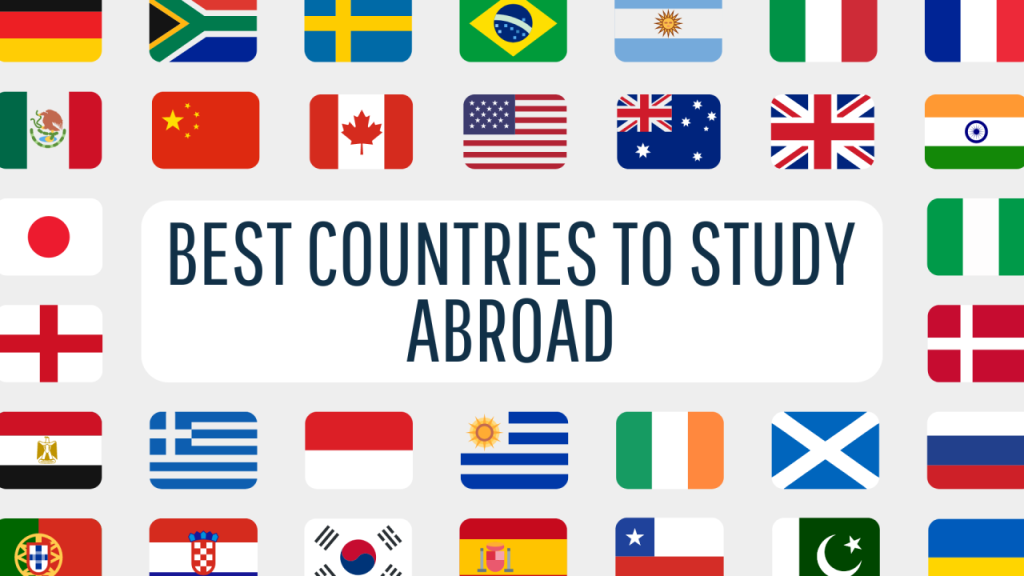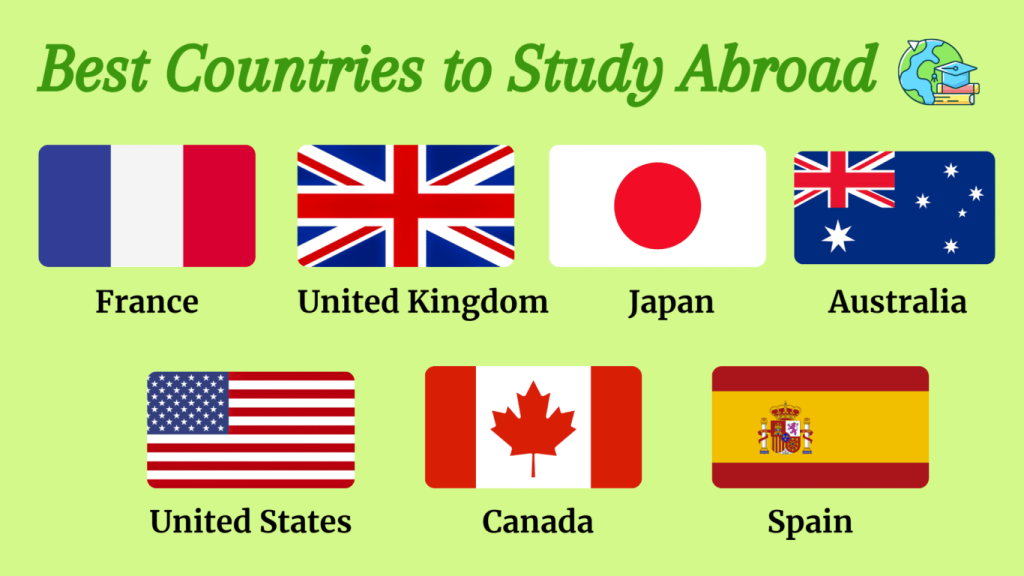How to Choose the Best Country to Study Abroad
Studying abroad is one of the most transformative experiences a student can have. Not only does it offer exposure to a new culture, but it also provides access to diverse academic programs, global networking opportunities, and personal growth. However, choosing the right country to pursue higher education is a critical decision that requires careful thought. The right country can influence your academic success, career trajectory, social experiences, and even your long-term life goals. This guide will walk you through everything you need to consider when deciding how to choose the best country to study abroad.

1. Define Your Academic and Career Goals
Before diving into country comparisons, it’s essential to clarify what you want to achieve academically and professionally. Ask yourself questions like:
- Which field of study am I passionate about?
- Do I want to pursue research, internships, or industry-focused education?
- What type of degree or certification will best serve my career goals?
Some countries are renowned for specific disciplines. For example, the United States is often preferred for business, technology, and liberal arts, whereas Germany is famous for engineering and applied sciences. The United Kingdom has a strong reputation for law, medicine, and literature. Aligning your goals with a country’s academic strengths can set the foundation for your success abroad.
2. Consider Language and Communication
Language is a major factor in determining where to study. While many countries offer programs in English, especially at the postgraduate level, day-to-day life outside the classroom can be challenging if you’re not familiar with the local language.
- English-speaking countries: USA, UK, Canada, Australia, New Zealand, Ireland.
- Non-English-speaking countries with English programs: Netherlands, Germany, Sweden, Denmark.
- Non-English programs requiring local language: France, Spain, Japan, South Korea.
Consider whether you want to learn a new language or focus purely on academic studies. Living in a country where you don’t speak the language can enhance cultural immersion, but it may also require additional effort to navigate daily life.
3. Examine Tuition Fees and Living Costs
Budget plays a crucial role in choosing the best country to study abroad. Tuition fees, cost of living, and hidden expenses vary widely from country to country.
- High-cost countries: USA, UK, Australia, Switzerland.
- Moderate-cost countries: Canada, Netherlands, France, Japan.
- Affordable options: Germany, Norway, India, Mexico.
Don’t forget to include additional expenses such as housing, transportation, food, healthcare, and study materials. Creating a monthly budget estimate for each country can help you realistically compare options.
4. Evaluate Scholarship and Funding Opportunities
Many countries and universities offer scholarships specifically for international students. Some programs cover tuition completely, while others may provide partial funding or living stipends. Investigating these opportunities can make studying abroad more affordable and may even influence your country choice.
- Look for government scholarships (e.g., DAAD in Germany, Chevening in the UK).
- University-specific scholarships for international students.
- Private foundations or corporate-sponsored scholarships.
Applying for scholarships often requires early preparation, including maintaining a high GPA, gathering recommendation letters, and crafting strong personal statements.

5. Assess Quality of Education and University Reputation
The academic reputation of universities in a country significantly impacts your study experience and future career opportunities. Consider the following factors:
- Global rankings: Use rankings like QS World University Rankings or Times Higher Education to compare universities.
- Faculty expertise and research opportunities: Check faculty profiles and ongoing research projects.
- Accreditation: Ensure the program is recognized both locally and internationally.
Remember, the highest-ranked university may not always be the best fit if it doesn’t align with your specific program or learning style.
6. Consider Work and Internship Opportunities
For many students, gaining international work experience is as important as earning a degree. Some countries allow students to work part-time during studies or offer post-study work visas.
- Generous work-study policies: Canada, Australia, Germany.
- Limited work opportunities: Japan, South Korea, some European countries.
Check whether your chosen country permits internships and whether these experiences are recognized as part of your academic program. Gaining work experience abroad can enhance your resume and help you establish a professional network.
7. Think About Cultural Fit and Lifestyle
Studying abroad is not just about academics; it’s also about adapting to a new culture and lifestyle. Factors to consider include:
- Climate and weather conditions.
- Cultural norms, traditions, and social behavior.
- Food, leisure activities, and student life.
- Safety and political stability.
Your comfort in adapting to the culture will significantly affect your overall experience. If possible, connect with current students or alumni from your prospective universities to gain firsthand insights.
8. Evaluate Visa and Immigration Policies
Visa regulations and post-study immigration options vary by country. Some countries make it easier for international students to stay and work after graduation, which can influence your long-term career plans.
- Student-friendly visas with work permits: Canada, Australia, New Zealand.
- Strict visa policies: USA, UK (recently tightened post-study work policies).
- Pathways to permanent residency: Canada, Germany, Australia.
Understanding these rules in advance helps prevent unexpected challenges and ensures your international education is a stepping stone rather than a hurdle.

9. Healthcare and Safety Considerations
Health and safety are crucial, especially for international students who may not be familiar with local healthcare systems. Investigate:
- Availability of student health insurance and coverage options.
- Quality and accessibility of medical facilities.
- Crime rates and general safety in the city or region.
Your peace of mind while studying abroad is as important as your academic performance.
10. Use Personal Priorities to Make the Final Decision
After researching all these factors, create a priority list based on your personal preferences. Rank countries according to:
- Academic opportunities
- Budget and funding
- Language and cultural fit
- Career prospects and work opportunities
- Lifestyle and safety
Weighing these priorities will help narrow down your choices and identify the country that best aligns with your goals.
11. Take Advantage of Technology and Resources
Several online tools can assist in making an informed decision:
- University comparison platforms like QS, Times Higher Education, and Studyportals.
- Student forums and social media groups for firsthand experiences.
- Official government websites for visas, scholarships, and regulations.
Use these resources to gather authentic information, compare options objectively, and reduce uncertainty.

12. Conclusion: Making Your Choice Confidently
Choosing the best country to study abroad is a multifaceted decision that goes beyond rankings or popularity. By clearly understanding your academic goals, personal preferences, financial capacity, and long-term aspirations, you can make a choice that maximizes both your educational and life experiences. Remember, the “best” country is not always the one with the most prestigious universities; it’s the one that aligns most closely with your unique goals, values, and aspirations.
Studying abroad is a journey of discovery, growth, and opportunity. Take your time, research thoroughly, and approach the decision with confidence. With the right planning, you’ll not only excel academically but also gain experiences that shape your worldview and enrich your future.